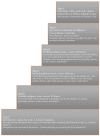Last Aid Course. An Education For All Citizens and an Ingredient of Compassionate Communities
- PMID: 30696095
- PMCID: PMC6473377
- DOI: 10.3390/healthcare7010019
Last Aid Course. An Education For All Citizens and an Ingredient of Compassionate Communities
Abstract
Due to demographic changes, the need for palliative care in the community and at home is expected to rise in the coming years. The care that is given by family members and general practitioners plays a vital role in basic palliative care. Knowledge in palliative care is very limited or totally absent in most communities, and information about the effects of educational procedures in teaching non-professionals in basic palliative care is sparse. In the Last Aid course, the public knowledge approach and the initial experiences from the implementation process are described. In addition, a review of the literature on educational efforts regarding palliative care for non-professionals and the existing literature on Last Aid courses is provided. An international working group has established a curriculum for Last Aid courses based on four teaching hours (45 minutes each). The feasibility of Last Aid courses for the public has been tested in pilot courses. The experiences with Last Aid courses in different countries are overall very positive. Last Aid courses are well-attended. The evaluation of questionnaires in a German pilot study has shown a favorable response. Last Aid courses may form the educational basis of compassionate communities, and are well-suited to inform the public about palliative care and end-of-life care.
Keywords: Last Aid course; compassionate communities; death; dying; home death; palliative care.
Conflict of interest statement
G.B. and B.K. may have potential conflicts of interest. G.B. and B.K. receive financial compensation for giving Last Aid Instructor courses. G.B. owns the trademark Last Aid. The other authors declare no conflict of interest.
Figures
References
-
- Ferri C.P., Prince M., Brayne C., Brodaty H., Fratiglioni L., Ganguli M., Hall K., Hasegawa K., Hendrie H., Huang Y., et al. Alzheimer’s Disease International. Global prevalence of dementia: A Delphi consensus study. Lancet. 2005;366:2112–2117. doi: 10.1016/S0140-6736(05)67889-0. - DOI - PMC - PubMed
-
- Chrismon Spezial, Das Evangelische Magazin zum Reformationstag 2014, im Auftrag der Evangelischen Kirche in Deutschlang (EKD), Was wir Glauben. Religion ist Privatsache? Prominente Protestanten Sprechen über Gott. [(accessed on 5 November 2018)]; Available online: http://static.evangelisch.de/get/?daid=jwhRNMB8FaGErjJle8tHi0fL00081222&....
-
- Gomes B., Higginson I.J., Calanzani N., Cohen J., Deliens L., Daveson B.A., Bechinger-English D., Bausewein C., Ferreira P.L., Toscani F., et al. Preferences for place of death if faced with advanced cancer: A population survey in England, Flanders, Germany, Italy, The Netherlands, Portugal and Spain. Ann. Oncol. 2012;23:2006–2015. doi: 10.1093/annonc/mdr602. - DOI - PubMed
Publication types
LinkOut - more resources
Full Text Sources



